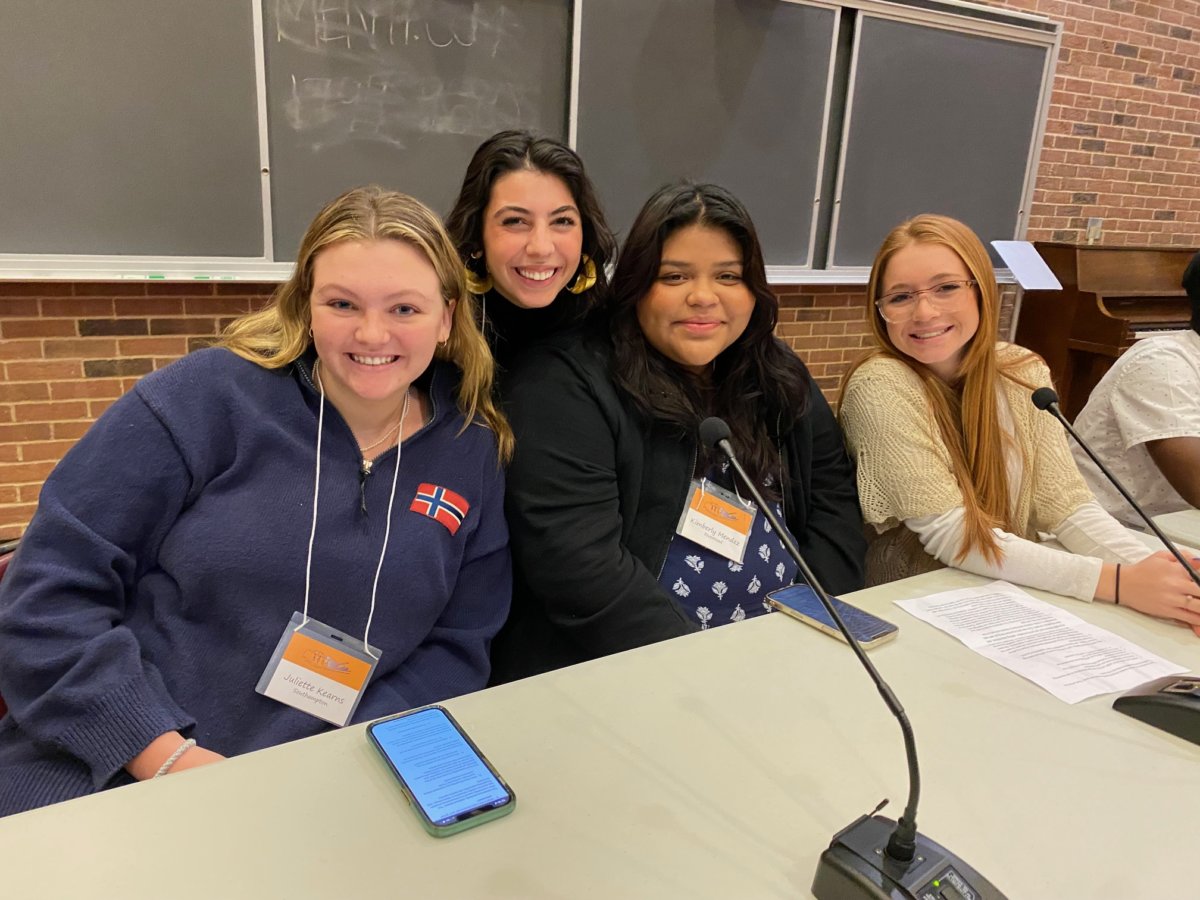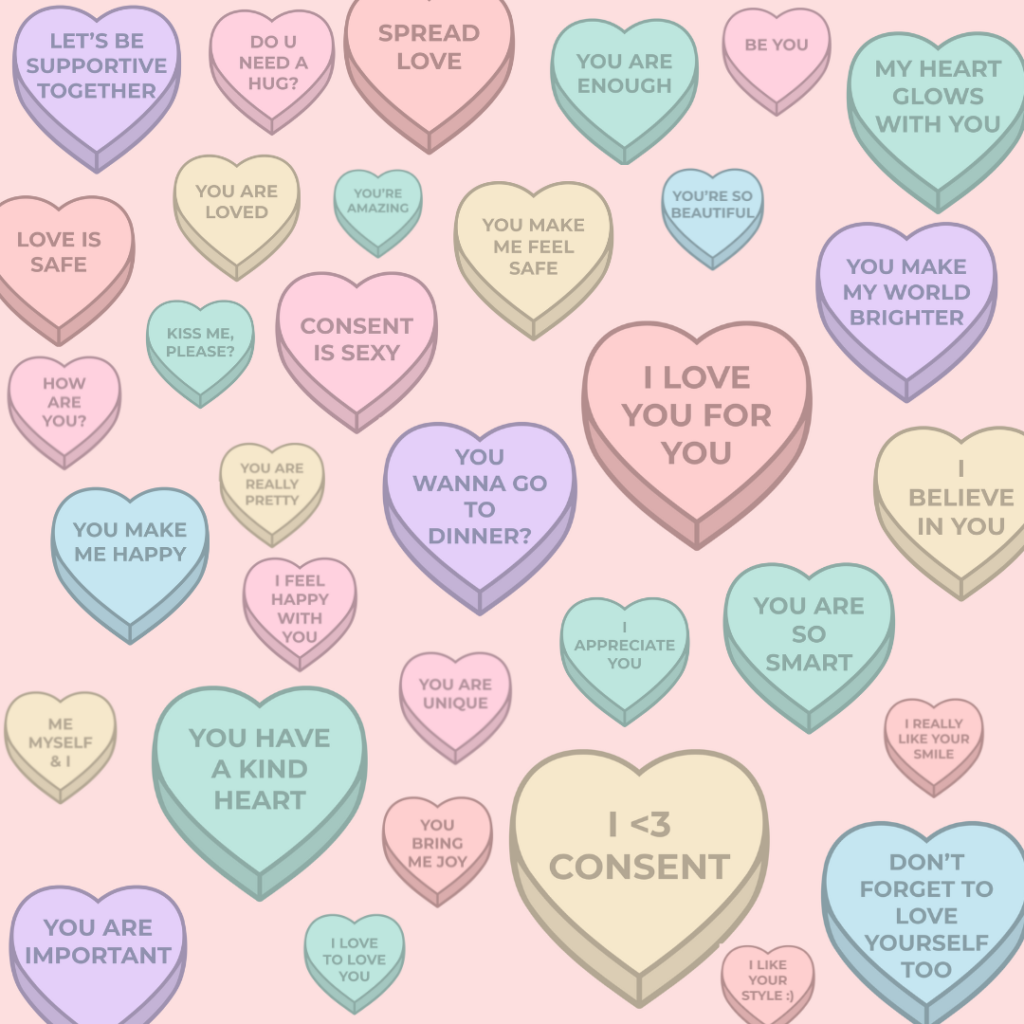Originally published by The East Hampton Star, posted on February 23, 2023.
Written by Christine Sampson.

You know those candy hearts with the cute sayings? The Retreat’s Teen Leadership Council, a group of East End students that explores healthy relationships through educational activities, honest conversations, and advocacy projects, has come up with an all new version with empowering phrases.
Instead of the usual “Be Mine,” “Sweet Talk,” and “Love Me,” the reinvented hearts say things like “I Believe in You,” “You Are Enough,” and “Consent Is Sexy.” It’s just one way the students are spending the month of February spreading awareness of the topic of teen dating violence.
“One of the important messages in Teen Leadership Council is that love is learned,” Juliette Kearns, a senior at Southampton High School and member of the council, said in an interview last week. The goal, she said, is “to have as many young people as we can have these tools and communication devices as early as possible, to stop something before it can happen.”
Helen Atkinson-Barnes, education program director of the East Hampton agency, said that in addition to the Retreat’s support programs for adults and families who are victims of domestic violence, it starts with programs in local elementary schools to help kids understand and build on healthy friendships.
“People’s relationship patterns start very early,” she said. “One of the things that we like to do is provide tools and skills and awareness so that if someone’s family life, community life, or peer relationship isn’t healthy, we can work to shift those early on and build skills especially around things like setting and respecting boundaries, physical space and emotional space, and recognizing discomfort even if it’s not articulated.”

It is important for adults to model healthy relationships for young people, Ms. Atkinson-Barnes said. “It’s not easy. One of the things we like to say is there are certainly extreme cases of violence in homes, and there are healthy relationships, but there is a big, messy middle where most of our relationships reside, and we’re working to make them healthier.”
In addition to physical or sexual violence, she said some of the signs of abuse in teen relationships are demanding online passwords, insisting on checking a partner’s phone, sharing pictures without permission, tracking someone’s location, and influencing how someone dresses or which friends he or she hangs out with.
“I think a misconception specifically about teen dating violence is that parents or adults might assume that they’ll notice if there’s something going on with their kid,” Juliette said. “But that’s not always the case, especially if the person is trying to hide it. To educate people is so important before that situation comes — and also to educate people on how to come out of it.”
According to the federal Centers for Disease Control, which compiled the extensive Youth Risk Behavior Survey in 2019, one in 12 teens experiences some form of physical dating violence. The organization Love Is Respect reports that only 33 percent of teens experiencing such abuse have ever told an adult about it, and that 81 percent of adults “believe teen dating violence is not an issue or admit they don’t know it’s an issue.”
Kimberly Mendez, a senior at Riverhead High School, said that it’s important for young people to understand this. “Oftentimes we are susceptible to experiencing depression or anxiety from dating violence, and it’s easy to develop coping mechanisms that are extremely unhealthy, like drug use.”
Aela Bailey, a senior at Riverhead High School, pointed out that girls aren’t the only ones who can be victims of dating violence — boys can be, too. “It’s important to bring awareness to males who may be going through abuse or trauma. Violence towards men is generally very stigmatized because of society’s rigid gender roles.”
She also pointed out that pornography, which is not always difficult for teens to access, often leads to “romanticizing” of abuse. “They don’t understand that what they’re seeing is not real life,” Aela said.
The group recently created a video, online at youtu.be/qA8xRTrPSzc, to encourage their peers to talk openly about these issues.
The Retreat’s Teen Leadership Council has multiple sessions per school year and is open to all teens on the East End. One of its advisers, Courtney Hyland, said enrollment has grown from about 20 to 30 kids in past years to as many as 60 for the current session. Their weekly meetings are virtual. More information can be found online at bit.ly/3E79hjI.
“We learn from them what they want to learn about,” Ms. Hyland said. “Our content changes every session based on what students are interested in discussing and talking about, based on what they are seeing. We always cover how to support others; how to be empathetic and compassionate; set boundaries; and feel comfortable, confident, and empowered to say ‘no.’ “
Aela said she likes that the program covers what healthy friendships look like, in addition to healthy romantic feelings. “You don’t have to always have a romantic relationship to experience certain types of abuse,” she said.
Summing up the impact of the program, Kimberly said that people describe her generation as “the generation of change, and I think that change starts with knowledge. Having Teen Leadership Council to teach us new things like this is really going to change our community.”

